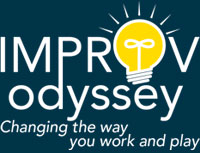Commentary on Spolin’s Tips and Pointers: Part 1
How we do something is the process of doing (right now!). Pre-planning “How” makes process impossible and so becomes resistance to the focus of the exercise, and no “explosion” or spontaneity can take place, making any change or alterations in the student-actor impossible. True improvisation re-shapes and alters the student-actor through the act of improvising itself. Penetration into the focus, connection, and a live relation with fellow players result in a change, alteration, or new understanding for one or the other or both. In time, during the solving of the acting problem the student becomes aware of being acted upon and of acting, thereby creating process and change within his or her stage life. The intuition gained remains with the player in everyday life, for whenever a circuit is opened for anyone, so to speak, it is usable everywhere. read more →
Just Be Yourself
We ape, we mimic, we mock. We act. — Laurence Olivier Have you ever walked into an interview or an audition and the interviewer, in an effort to relax you, tells you “just be yourself”? And rather than helping you, you only get more butterflies in your stomach? Your mind races. “What does that mean.. read more →
Story, story…LIVE!
The game of Building a Story is a staple with improv groups around the world. It is the essence of collaboration by building a story one word at a time and by sharing ideas using give and take and intense listening. Invariably, the challenge wakes you up and your focus becomes stronger. There are many.. read more →
Improvisation is an ideal way to practice the art of Crisis Management
Transformation: The Value of Emergency in Play or Creating Healthy Crisis “In the middle of difficulty lies opportunity.” ~Albert Einstein How do you begin to effect transformation? What sparks change? Answer – crisis. What happens during a crisis is critical for change. …reform is usually possible only once a sense of crisis takes hold. Good leaders.. read more →
Play is Essential to Life & Work
I got this link from a colleague, Rob Adler. Again, here is someone else who sees what we need as a society and how important play is. This argues for the same paradigm shift Improv Odyssey advocates. There are people out there who can lead you back to that essential ingredient that not only relieves.. read more →
The Magic Bond of Playing
After 35 years of playing Spolin Games with various groups, I’ve noticed an interesting thing. I am struck by the fact that these groups as a result of playing together for an extended period, keep in touch with each other and often come together to play as opportunity permits. My first observation of this phenomenon.. read more →
Finding Happiness in Life & Work
Playing games teaches a basic morality. This morality comes from the fact that in order to have fun playing the game, one must follow the rules. It is the rules of the game that allows us to get the fun out of playing. Games present challenges and meeting those challenges constitutes fun. Subverting those challenges.. read more →
The Difference between Spolin Games and Popular Improv
There is a profundity in Spolin’s work that is hard to capture and commoditize. It cannot be learned intellectually, but must be experienced firsthand to really be understood. There are only a handful of teachers carrying on her tradition, myself being one of them.
Improvisation began with Spolin. But other popular forms have emerged as more popular and have swept the world. I will try to explain the reason for this. read more →
Improv – The Long and the Short of It
Short Form and Long Form are the same The distinction between short form and long form is a development that stems from the going awry or misunderstanding the focus of a game. These terms get bandied about as if they are two separate disciplines. They are not. Spolin used these games as exercises to help.. read more →
Show! Don’t Tell!
When you don’t see where you are, all you can do is talk about it. You get a suggestion for a scene: Who — A husband and wife. Where — at Disneyland. What — waiting to get on a ride. Most players will begin the scene with dialogue something like this. Husband: Well, well, dear.. read more →








